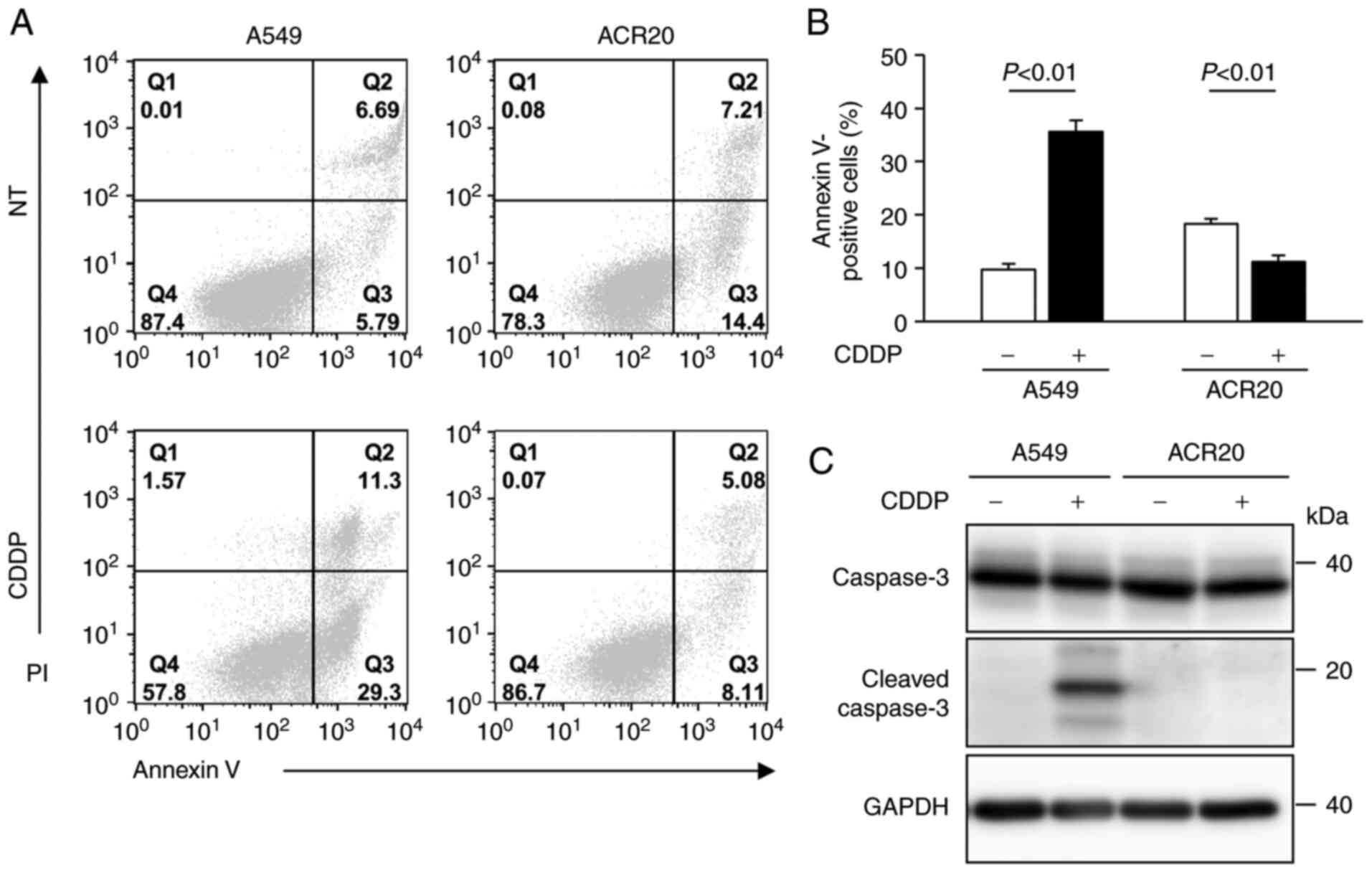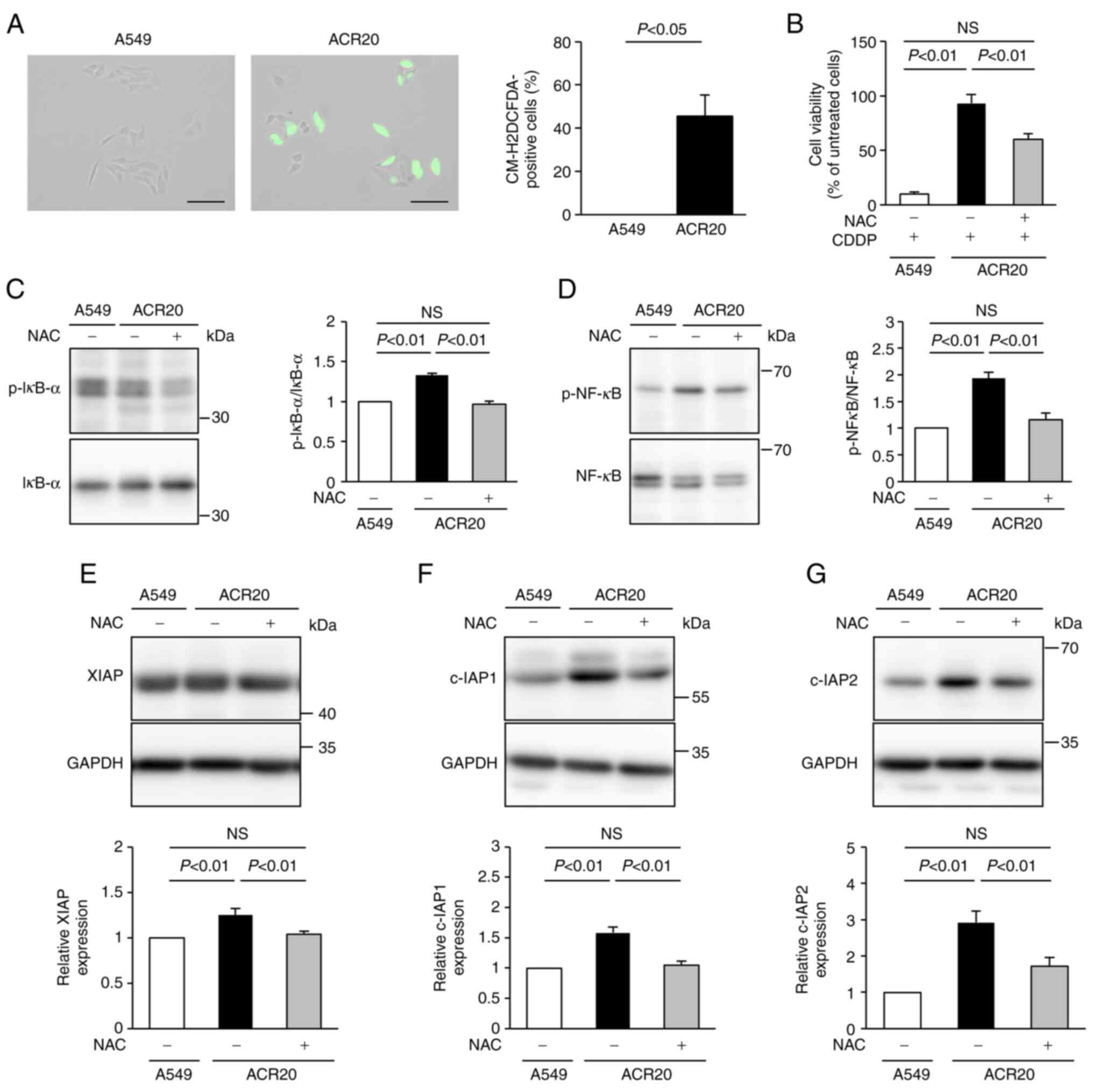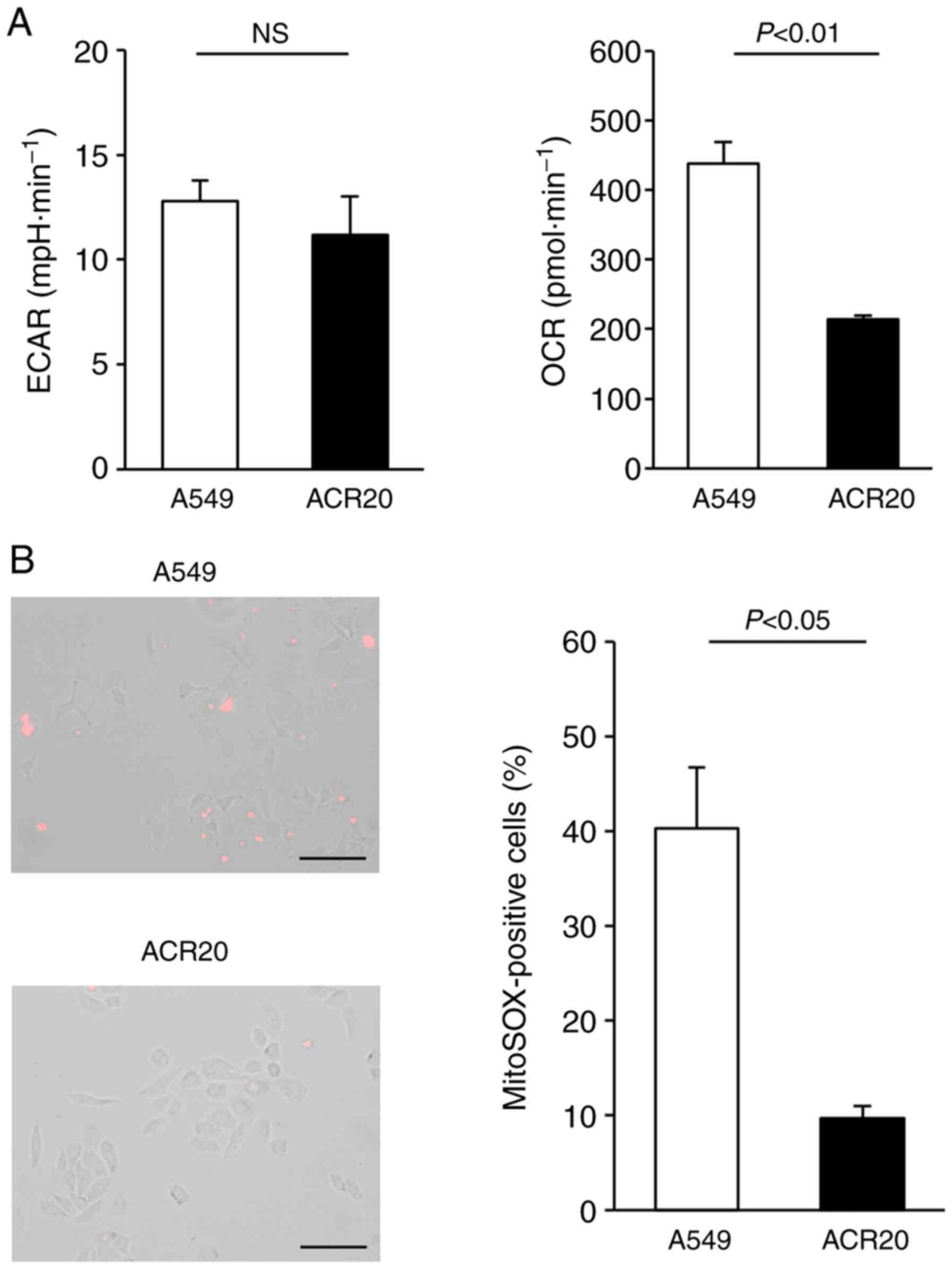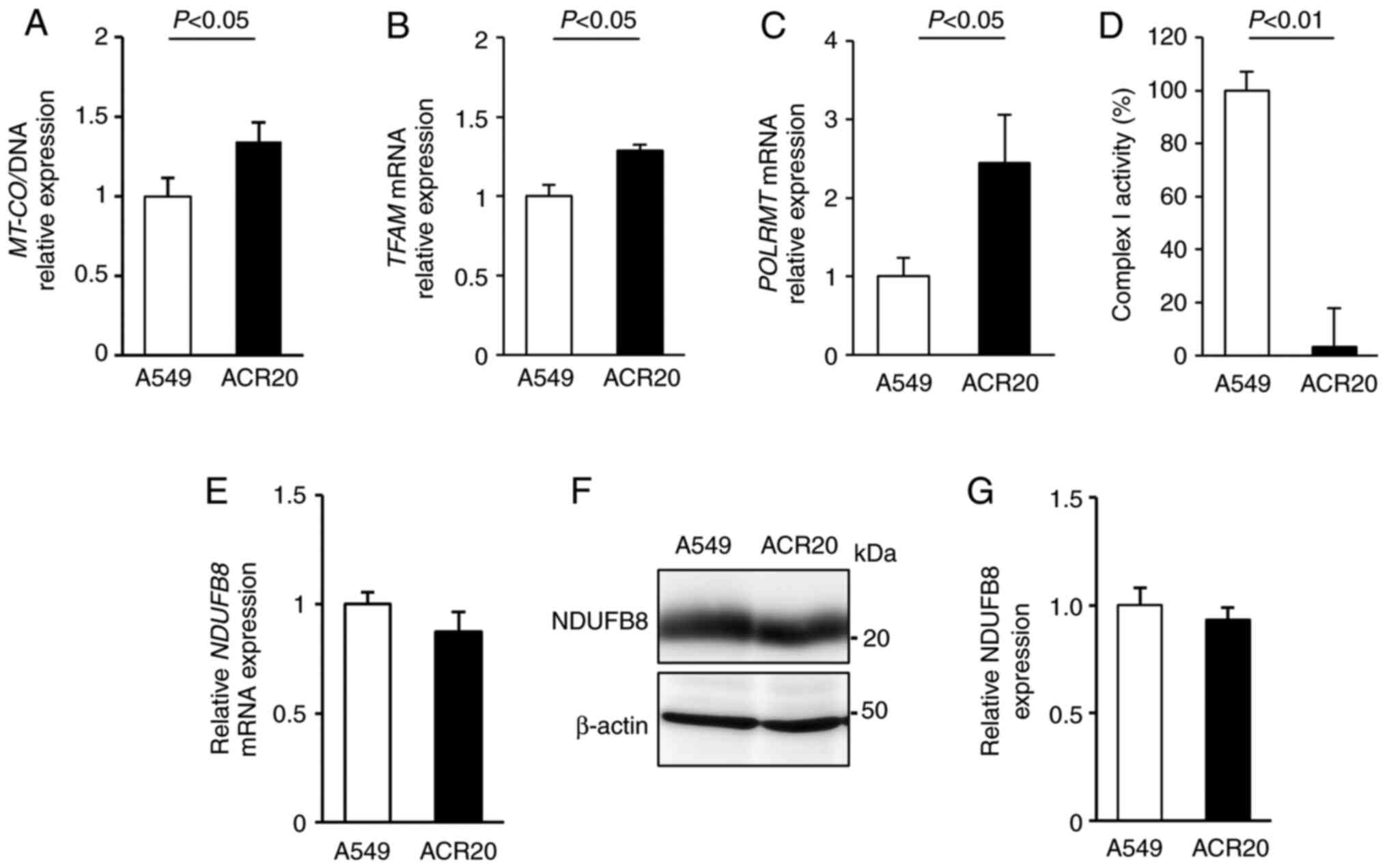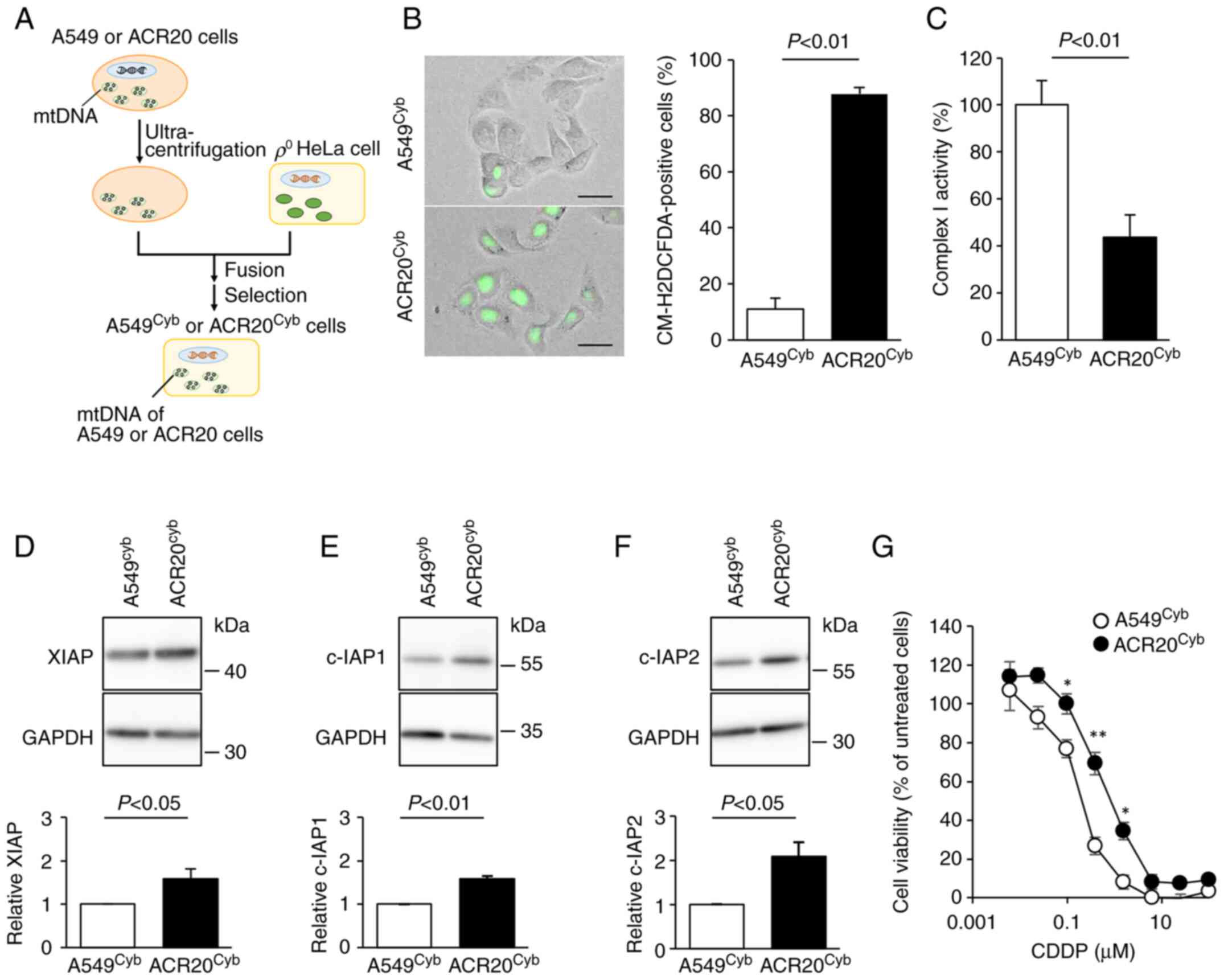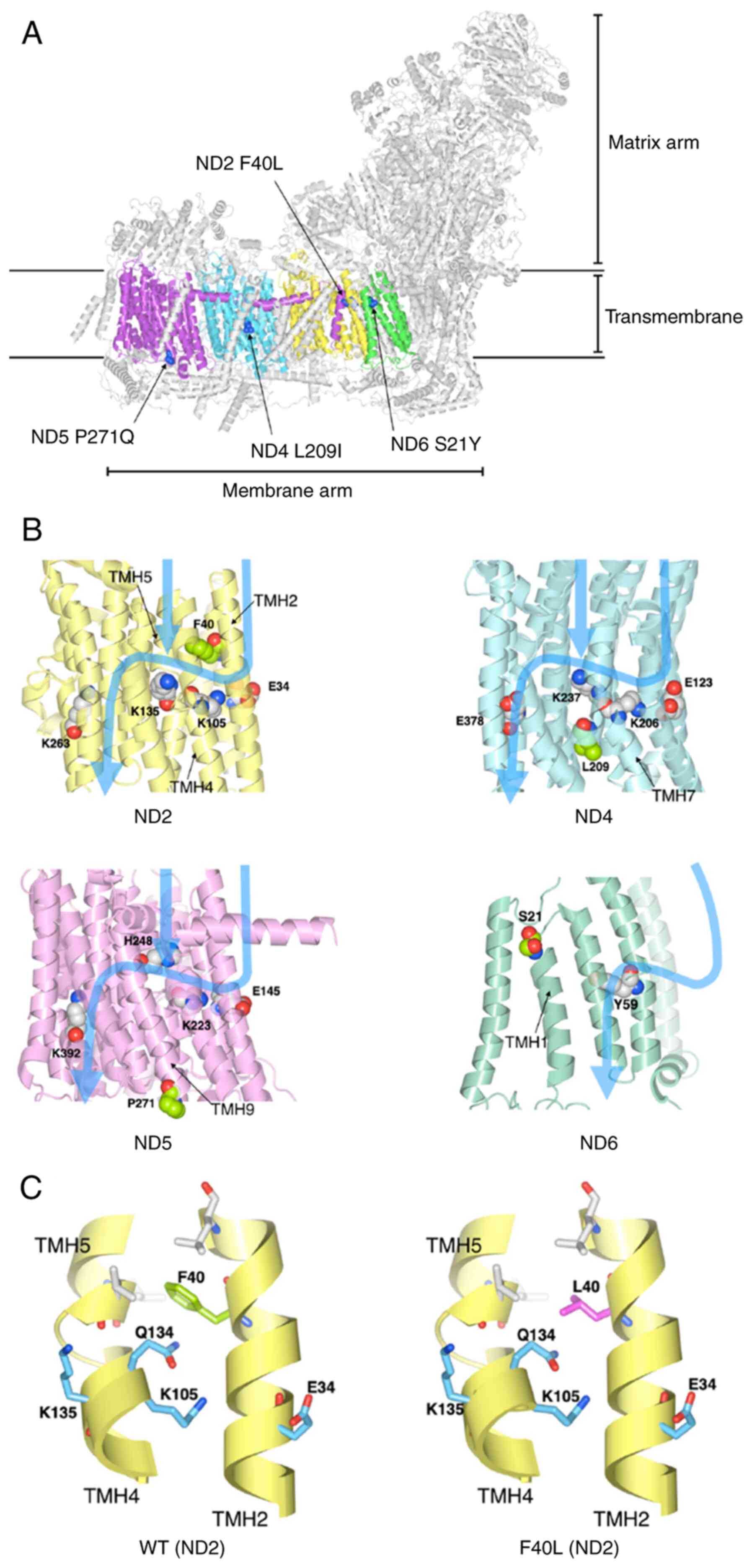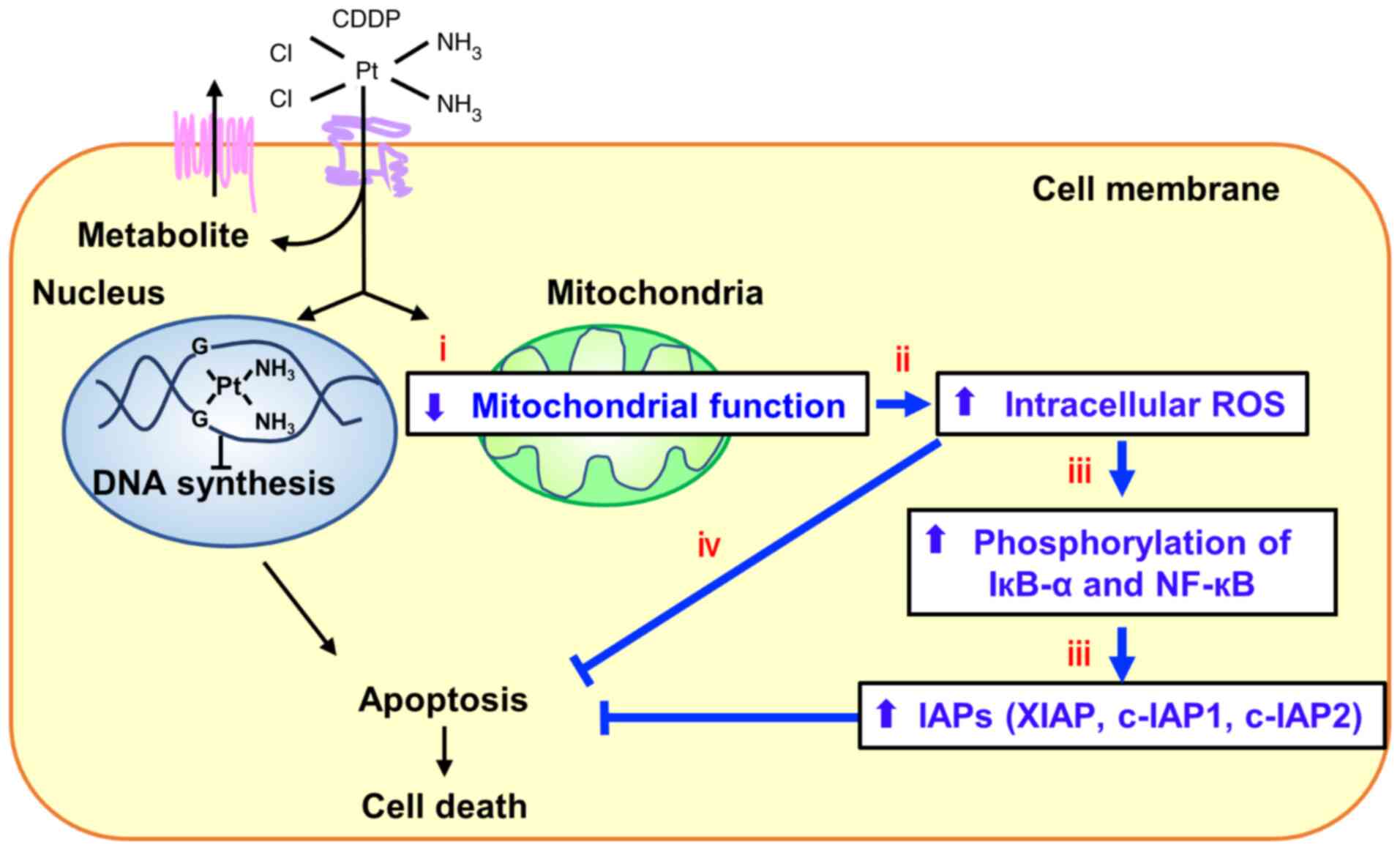|
1
|
Galluzzi L, Senovilla L, Vitale I, Michels
J, Martins I, Kepp O, Castedo M and Kroemer G: Molecular mechanisms
of cisplatin resistance. Oncogene. 31:1869–1883. 2012. View Article : Google Scholar : PubMed/NCBI
|
|
2
|
Gandhi L, Rodriguez-Abreu D, Gadgeel S,
Esteban E, Felip E, Angelis FD, Domine M, Clingan P, Hochmair MJ,
Powell SF, et al: Pembrolizumab plus chemotherapy in metastatic
non-small-cell lung cancer. N Engl J Med. 378:2078–2092. 2018.
View Article : Google Scholar : PubMed/NCBI
|
|
3
|
Paz-Ares LG, Luft A, Tafreshi A, Gumus M,
Mazieres J, Hermes B, Senler FC, Fülöp A, Rodriguez-Cid J, Sugawara
S, et al: Phase 3 study of carboplatin-paclitaxel/nab-paclitaxel
(Chemo) with or without pembrolizumab (Pembro) for patients (Pts)
with metastatic squamous (Sq) non-small cell lung cancer (NSCLC). J
Clin Oncol. 36 (15_Suppl):S105. 2018. View Article : Google Scholar
|
|
4
|
Komatsu M, Sumizawa TS, Mutoh M, Chen ZS,
Terada K, Furukawa T, Yang XL, Gao H, Miura N, Sugiyama T and
Akiyama S: Copper-transporting P-type adenosine triphosphatase
(ATP7B) is associated with cisplatin resistance. Cancer Res.
60:1312–1316. 2000.PubMed/NCBI
|
|
5
|
Lai GM, Ozols RF, Young RC and Hamilton
TC: Effect of glutathione on DNA repair in cisplatin-resistant
human ovarian cancer cell lines. J Natl Cancer Inst. 7:535–539.
1989. View Article : Google Scholar : PubMed/NCBI
|
|
6
|
Zeng-Rong N, Paterson J, Alpert L, Tsao
MS, Viallet J and Alaoui-Jamali MA: Elevated DNA repair capacity is
associated with intrinsic resistance of lung cancer to
chemotherapy. Cancer Res. 55:4760–4764. 1995.PubMed/NCBI
|
|
7
|
Horibe S, Kawauchi S, Tanahashi T, Sasaki
N, Mizuno S and Rikitake Y: CD44v-dependent upregulation of xCT is
involved in the acquisition of cisplatin-resistance in human lung
cancer A549cells. Biochem Biophys Res Commun. 507:426–432. 2018.
View Article : Google Scholar : PubMed/NCBI
|
|
8
|
Choi YM, Kim HK, Shim W, Anwar MA, Kwon
JW, Kwon HK, Kim HJ, Jeong H, Kim HM, Hwang D, et al: Mechanism of
cisplatin-induced cytotoxicity is correlated to impaired metabolism
due to mitochondrial ROS generation. PLoS One. 10:e01350832015.
View Article : Google Scholar : PubMed/NCBI
|
|
9
|
Wang SF, Chen MS, Chou YC, Ueng YF, Yin
PH, Yeh TS and Lee HC: Mitochondrial dysfunction enhances cisplatin
resistance in human gastric cancer cells via the ROS-activated
GCN2-eIF2α-ATF4-xCT pathway. Oncotarget. 7:74132–74151. 2016.
View Article : Google Scholar : PubMed/NCBI
|
|
10
|
Tuppen HA, Blakely EL, Turnbull DM and
Taylor RW: Mitochondrial DNA mutations and human disease. Biochim
Biophys Acta. 1797:113–128. 2010. View Article : Google Scholar : PubMed/NCBI
|
|
11
|
Yang Z, Schumaker LM, Egorin MJ, Zuhowski
EG, Guo Z and Cullen KJ: Cisplatin preferentially binds
mitochondrial DNA and voltage-dependent anion channel protein in
the mitochondrial membrane of head and neck squamous cell
carcinoma: Possible role in apoptosis. Clin Cancer Res.
12:5817–5825. 2006. View Article : Google Scholar : PubMed/NCBI
|
|
12
|
Olivero OA, Semino C, Kassim A,
Lopez-Larraza DM and Poirier MC: Preferential binding of cisplatin
to mitochondrial DNA of Chinese hamster ovary cells. Mutat Res.
346:221–230. 1995. View Article : Google Scholar : PubMed/NCBI
|
|
13
|
Gonzalez-Sanchez E, Marin JJ and Perez MJ:
The expression of genes involved in hepatocellular carcinoma
chemoresistance is affected by mitochondrial genome depletion. Mol
Pharm. 11:1856–1868. 2014. View Article : Google Scholar : PubMed/NCBI
|
|
14
|
Hayashi J, Ohta S, Kikuchi A, Takemitsu M,
Goto Y and Nonaka I: Introduction of disease-related mitochondrial
DNA deletions into HeLa cells lacking mitochondrial DNA results in
mitochondrial dysfunction. Proc Natl Acad Sci USA. 88:10614–10618.
1991. View Article : Google Scholar : PubMed/NCBI
|
|
15
|
Horibe S, Matsuda A, Tanahashi T, Inoue J,
Kawauchi S, Mizuno S, Ueno M, Takahashi K, Maeda Y, Maegouchi T, et
al: Cisplatin resistance in human lung cancer cells is linked with
dysregulation of cell cycle associated proteins. Life Sci.
124:31–40. 2015. View Article : Google Scholar : PubMed/NCBI
|
|
16
|
King MP and Attardi G: Human cells lacking
mtDNA: Repopulation with exogenous mitochondria by complementation.
Science. 246:500–503. 1989. View Article : Google Scholar : PubMed/NCBI
|
|
17
|
Ishikawa K, Takenaga K, Akimoto M,
Koshikawa N, Yamaguchi A, Imanishi H, Nakada K, Honma Y and Hayashi
JI: ROS-generating mitochondrial DNA mutations can regulate tumor
cell metastasis. Science. 320:661–664. 2008. View Article : Google Scholar : PubMed/NCBI
|
|
18
|
Semba H, Takeda N, Isagawa T, Sugiura Y,
Honda K, Wake M, Miyazawa H, Yamaguchi Y, Miura M, Jenkins DM, et
al: HIF-1α-PDK1 axis-induced active glycolysis plays an essential
role in macrophage migratory capacity. Nat Commun. 7:116352016.
View Article : Google Scholar : PubMed/NCBI
|
|
19
|
Livak KJ and Schmittgen TD: Analysis of
relative gene expression data using real-time quantitative PCR and
the 2(−Delta Delta C(T)) method. Methods. 25:402–408. 2001.
View Article : Google Scholar : PubMed/NCBI
|
|
20
|
Cai X, Lu W, Yang Y, Yang J, Ye J, Gu Z,
Hu C, Wang X and Cao P: Digitoflavone inhibits IκBα kinase and
enhances apoptosis induced by TNFα through downregulation of
expression of nuclear factor κB-regulated gene products in human
pancreatic cancer cells. PLoS One. 8:e771262013. View Article : Google Scholar : PubMed/NCBI
|
|
21
|
Karin M: The beginning of the end: IkappaB
kinase (IKK) and NF-kappaB activation. J Biol Chem.
274:27339–27342. 1999. View Article : Google Scholar : PubMed/NCBI
|
|
22
|
Murphy MP: Mitochondrial dysfunction
indirectly elevates ROS production by the endoplasmic reticulum.
Cell Metab. 18:145–146. 2013. View Article : Google Scholar : PubMed/NCBI
|
|
23
|
Tafani M, Sansone L, Limana F, Arcangeli
T, Santis ED, Polese M, Fini M and Russo MA: The interplay of
reactive oxygen species, hypoxia, inflammation, and sirtuins in
cancer initiation and progression. Oxid Med Cell Longev.
2016:39071472016. View Article : Google Scholar : PubMed/NCBI
|
|
24
|
Saybaşili H, Yüksel M, Haklar G and Yalçin
AS: Effect of mitochondrial electron transport chain inhibitors on
superoxide radical generation in rat hippocampal and striatal
slices. Antioxid Redox Signal. 3:1099–1104. 2001. View Article : Google Scholar : PubMed/NCBI
|
|
25
|
Staniek K, Gille L, Kozlov AV and Nohl H:
Mitochondrial superoxide radical formation is controlled by
electron bifurcation to the high and low potential pathways. Free
Radic Res. 36:381–387. 2002. View Article : Google Scholar : PubMed/NCBI
|
|
26
|
Wu J, Jin Z, Zheng H and Yan LJ: Sources
and implications of NADH/NAD(+) redox imbalance in diabetes and its
complications. Diabetes Metab Syndr Obes. 9:145–153.
2016.PubMed/NCBI
|
|
27
|
Wiedemann FR, Manfredi G, Mawrin C, Beal
MF and Schon EA: Mitochondrial DNA and respiratory chain function
in spinal cords of ALS patients. J Neurochem. 80:616–625. 2002.
View Article : Google Scholar : PubMed/NCBI
|
|
28
|
Rusecka J, Kaliszewska M, Bartnik E and
Tońska K: Nuclear genes involved in mitochondrial diseases caused
by instability of mitochondrial DNA. J Appl Genet. 59:43–57. 2018.
View Article : Google Scholar : PubMed/NCBI
|
|
29
|
Cote HC, Brumme ZL, Craib KJ, Alexander
CS, Wynhoven B, Ting L, Wong H, Harris M, Harrigan PR,
O'Shaughnessy MV and Montaner JS: Changes in mitochondrial DNA as a
marker of nucleoside toxicity in HIV-infected patients. N Engl J
Med. 346:811–820. 2002. View Article : Google Scholar : PubMed/NCBI
|
|
30
|
Mambo E, Gao X, Cohen Y, Guo Z, Talalay P
and Sidransky D: Electrophile and oxidant damage of mitochondrial
DNA leading to rapid evolution of homoplasmic mutations. Proc Natl
Acad Sci USA. 100:1838–1843. 2003. View Article : Google Scholar : PubMed/NCBI
|
|
31
|
Kang D, Kim SH and Hamasaki N:
Mitochondrial transcription factor A (TFAM): Roles in maintenance
of mtDNA and cellular functions. Mitochondrion. 7:39–44. 2007.
View Article : Google Scholar : PubMed/NCBI
|
|
32
|
Kuhl I, Miranda M, Posse V, Milenkovic D,
Mourier A, Siira SJ, Bonekamp NA, Neumann U, Filipovska A, Polosa
PL, et al: POLRMT regulates the switch between replication primer
formation and gene expression of mammalian mtDNA. Sci Adv.
2:e16009632016. View Article : Google Scholar : PubMed/NCBI
|
|
33
|
Zhu J, Vinothkumar KR and Hirst J:
Structure of mammalian respiratory complex I. Nature. 536:354–358.
2016. View Article : Google Scholar : PubMed/NCBI
|
|
34
|
Fiedorczuk K, Letts JA, Degliesposti G,
Kaszuba K, Skehel M and Sazanov LA: Atomic structure of the entire
mammalian mitochondrial complex I. Nature. 538:406–410. 2016.
View Article : Google Scholar : PubMed/NCBI
|
|
35
|
Fiedorczuk K and Sazanov LA: Mammalian
mitochondrial complex I structure and disease-causing mutations.
Trends Cell Biol. 28:835–867. 2018. View Article : Google Scholar : PubMed/NCBI
|
|
36
|
Deveraux QL, Takahashi R, Salvesen GS and
Reed JC: X-linked IAP is a direct inhibitor of cell-death
proteases. Nature. 388:300–304. 1997. View
Article : Google Scholar : PubMed/NCBI
|
|
37
|
Takahashi R, Deveraux Q, Tamm I, Welsh K,
Assa-Munt N, Salvesen GS and Reed JC: A single BIR domain of XIAP
sufficient for inhibiting caspases. J Biol Chem. 273:7787–7790.
1998. View Article : Google Scholar : PubMed/NCBI
|
|
38
|
Roy N, Deveraux QL, Takahashi R, Salvesen
GS and Reed JC: The c-IAP-1 and c-IAP-2 proteins are direct
inhibitors of specific caspases. EMBO J. 16:6914–6925. 1997.
View Article : Google Scholar : PubMed/NCBI
|
|
39
|
Maier JKX, Lahoua Z, Gendron NH, Fetni R,
Johnston A, Davoodi J, Rasper D, Roy S, Slack RS, Nicholson DW and
MacKenzie AE: The neuronal apoptosis inhibitory protein is a direct
inhibitor of caspases 3 and 7. J Neurosci. 22:2035–2043. 2002.
View Article : Google Scholar : PubMed/NCBI
|
|
40
|
Davoodi J, Lin L, Kelly J, Liston P and
MacKenzie AE: Neuronal apoptosis-inhibitory protein does not
interact with Smac and requires ATP to bind caspase-9. J Biol Chem.
279:40622–40628. 2004. View Article : Google Scholar : PubMed/NCBI
|
|
41
|
Todor IN, Lukyanova NY and Chekhun VF: The
lipid content of cisplatin- and doxorubicin-resistant MCF-7 human
breast cancer cells. Exp Oncol. 34:97–100. 2012.PubMed/NCBI
|
|
42
|
Vafa O, Wade M, Kern S, Beeche M, Pandita
TK, Hampton GM and Wahl GM: c-Myc can induce DNA damage, increase
reactive oxygen species, and mitigate p53 function. Mol Cell.
9:1031–1044. 2002. View Article : Google Scholar : PubMed/NCBI
|
|
43
|
Hlavata L, Aguilaniu H, Pichová A and
Nyström T: The oncogenic RAS2(val19) mutation locks respiration,
independently of PKA, in a mode prone to generate ROS. EMBO J.
22:3337–3345. 2003. View Article : Google Scholar : PubMed/NCBI
|
|
44
|
Lim JKM and Leprivier G: The impact of
oncogenic RAS on redox balance and implications for cancer
development. Cell Death Dis. 10:9552019. View Article : Google Scholar : PubMed/NCBI
|
|
45
|
Mizutani S, Miyato Y, Shidara Y, Asoh S,
Tokunaga A, Tajiri T and Ohta S: Mutations in the mitochondrial
genome confer resistance of cancer cells to anticancer drugs.
Cancer Sci. 100:1680–1687. 2009. View Article : Google Scholar : PubMed/NCBI
|
|
46
|
Kidani A, Izumi H, Yoshida Y, Kashiwagi E,
Ohmori H, Tanaka T, Kuwano M and Kohno K: Thioredoxin2 enhances the
damaged DNA binding activity of mtTFA through direct interaction.
Int J Oncol. 35:1435–1440. 2009.PubMed/NCBI
|
|
47
|
Altieri DC: Survivin, cancer networks and
pathway-directed drug discovery. Nat Rev Cancer. 8:61–70. 2008.
View Article : Google Scholar : PubMed/NCBI
|
|
48
|
Cory S and Adams JM: The Bcl2 family:
Regulators of the cellular life-or-death switch. Nat Rev Cancer.
2:647–656. 2002. View
Article : Google Scholar : PubMed/NCBI
|















